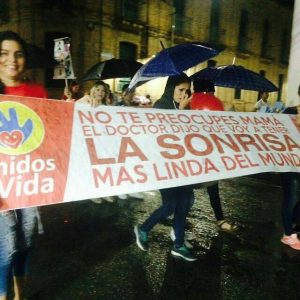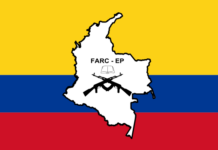
This Saturday, May 5, 42 cities across Colombia will take part in a march organised by the NGO Unidos por la Vida, in protest of abortion. The march is currently being supported by the social media campaign ‘Marcha Virtual por la Vida’, which has been circulating the internet since April 30.
The NGO, who state that their aim as Roman Catholics is to “respect human life from the point of conception until natural death”, has been running and organising the national march for a total of 12 years.
Their main objectives are to encourage the Constitutional Courts to revoke the de-penalisation changes put in place by the Colombian government in the year 2006, legalising abortion in three specific cases. These include: if the pregnancy presents a danger to the mother’s physical or mental health, foetal abnormality, or if the pregnancy is a result of rape or incest.
The social media campaign, which features publications every day this week at 11am, is focused around several hashtags, each one conveying in some way the NGO’s stance on abortion. The first handle, #NoAlAborto was trending nationally on Twitter in Colombia this Monday evening. Other hashtags currently circulating include #DiosTeCreó, #EutanasiaNo, #LaVirgenTeApoya, #ConcienciaEnPAZ and #MarchaPorLaVida.
“We have lent our feet to march for those who cannot. We have raised our voices for those who cannot yet do so”, say the organisers of Saturday’s march.
Like most countries in South America, opinions on the subject are very much divided. However, according to Profamilia, one of the largest issues surrounding the topic of abortion in Colombia is the fact that many women are unaware of the three de-penalisation changes that are now 12 years old. In fact, a Profamilia survey carried out last year revealed that only 56.1% percent of women aged between 13 and 49 are aware of the clauses that have legalised abortion in specific circumstances.
Investigations led by La Mesa por la Vida y La Salud de las Mujeres last year showed that over half of Colombian women (62%) believe that the decision to voluntarily interrupt a pregnancy should be the woman’s alone. The surveys, which were carried out in 32 of Colombia’s cities and in 2,277 households, also showed that 50% of those questioned did not agree with imprisoning women for choosing to abort.
In the build-up to this year’s elections, abortion is a topic which has been hardly touched upon in the debates between presidential candidates. Having said that, there’s little to debate between the candidates, as all of the major remaining candidates maintain the same position in that they respect the Constitutional Court’s decision to permit the termination of a pregnancy in the three aforementioned cases. None of them hold the position held by pro-life movements like Unidos por la Vida though none of the remaining candidates are willing to extend the woman’s right to choose beyond the three exceptions either.
Recent pro-choice movements in favour of abortion outside these exceptions have mobilised in Argentina though, as seen by the support garnered by Marcha por la Vida, it is unlikely that pro-choice movements will gather support in Colombia anytime soon.











